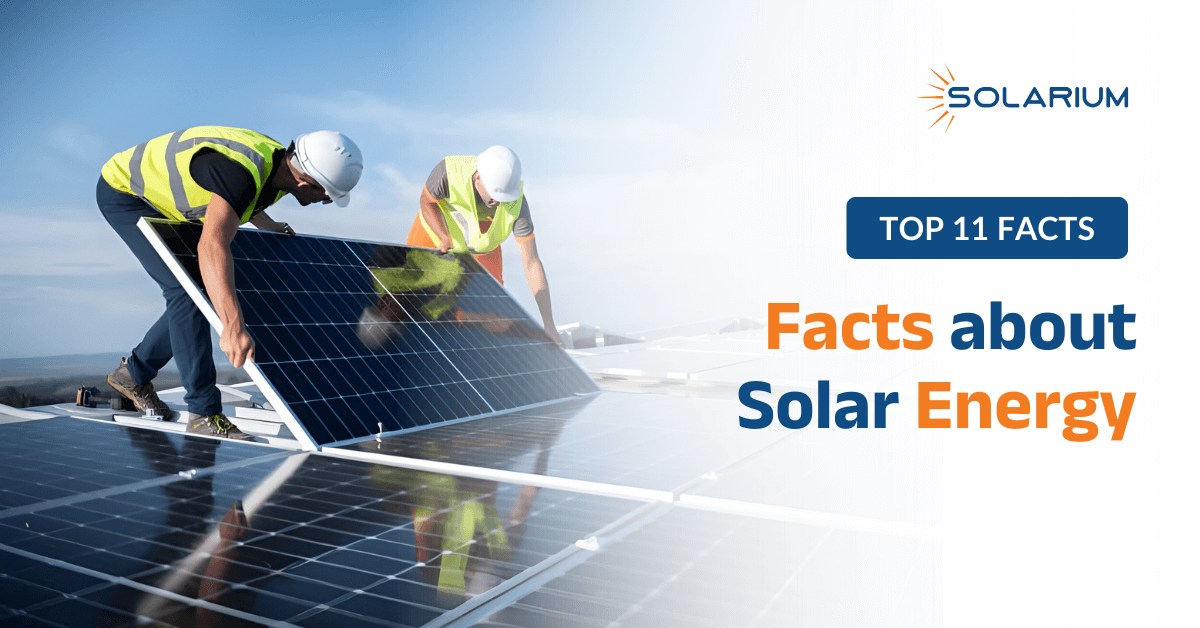Table of Contents:
Imagine a world where the sun does more than just warm our days—it becomes an essential part of our survival. Picture a small town, once plagued by frequent power outages and sky-high electricity bills. But then, everything changed. The community decided to embrace the sun’s energy, installing solar panels on every rooftop, forever altering their way of life.
The facts about solar energy show how this shift to solar power transformed the town in remarkable ways. Every evening, children now study under bright lights, businesses flourish with uninterrupted energy, and the air has never been cleaner.
This is the true promise of solar energy: a world where the sun’s unlimited power fuels innovation, strengthens local economies and fosters healthier environments.
In this blog, we explain some important solar facts to highlight how this renewable energy source offers sustainable and cost-effective alternatives that benefit both the planet and people. By using solar energy, we are not just reducing our carbon footprint—we’re creating a cleaner, more prosperous future for all.
Importance of Solar Energy: Why Solar Energy Matters?
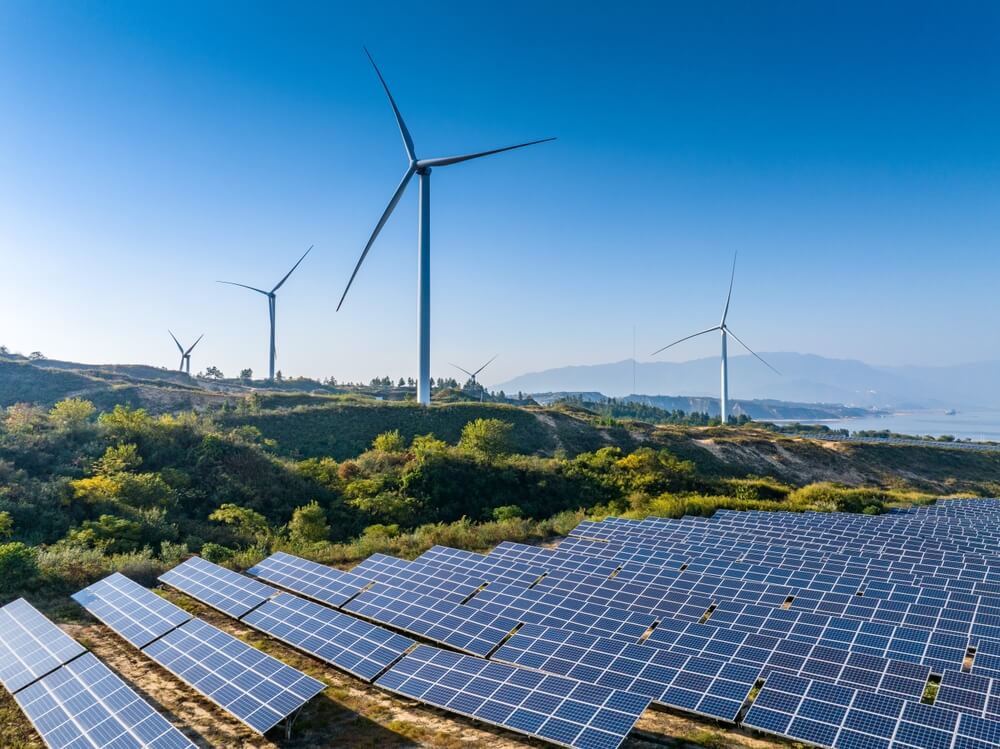
Solar power facts reveal that solar energy offers an environmentally friendly solution to some of the world’s most pressing problems. One of the key facts about solar energy is its ability to reduce energy costs while decreasing dependence on non-renewable resources.
Embracing solar power addresses these critical issues and paves the way for a cleaner, more sustainable future. The following solar power facts clearly show how solar energy is a key player in reducing environmental impact and enhancing energy security, making it an essential part of the global energy transition.
The Basics of Solar Energy
Solar energy is a powerful, renewable resource that can be used to generate electricity and heat in various ways. Before we start with the facts about solar energy, let’s understand the basics of how homes, companies, and even entire cities can be powered by it.
How Solar Energy Works?
When sunlight hits a solar panel, its photovoltaic (PV) cells quickly absorb the energy and convert it into electricity. The cells generate electrical charges, which move in response to the panel’s electric field, allowing electricity to flow and power homes, large organizations, and even entire cities.
Types of Solar Energy
Solar energy can be utilized in different ways, primarily through photovoltaic cells and solar thermal energy.
Photovoltaic Cells
Solar panels, or photovoltaic cells, are designed to convert sunlight into electricity. These panels are made from silicon, which is treated to absorb sunlight effectively and generate electric current.
The term “photovoltaic” combines two words: “photo,” meaning light, and “voltaic,” named after Alessandro Volta, the Italian physicist who devised the voltaic collection, which was the predecessor to the modern charger.
This process is the foundation of many facts about solar panels and their effectiveness in generating clean, renewable power.
Solar Thermal Energy
Another type of solar energy, solar thermal energy, works differently by using sunlight to heat a liquid, which is then used to produce heating or electricity.
This is different from the photovoltaic panels, which directly convert sunlight into electrical current. While both technologies utilize the sun’s power, solar thermal energy focuses on using heat for practical applications like heating water or generating steam for electricity.
Top 11 Solar Energy Facts You Should Know
1. Solar energy is renewable and plentiful
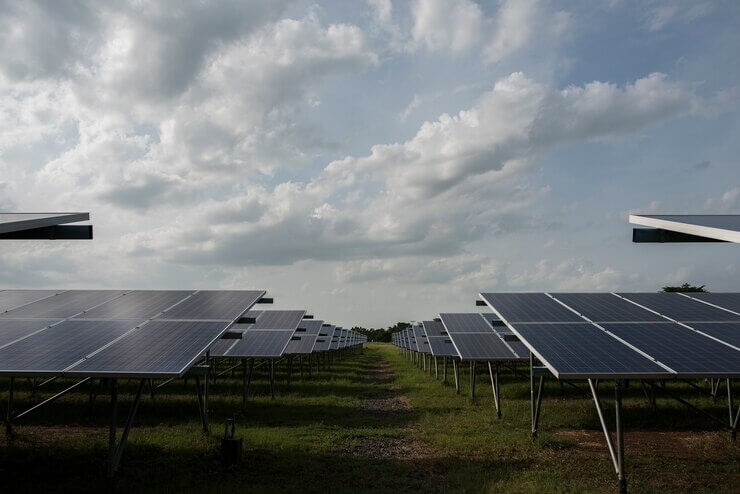
Solar energy is one of the most abundant and sustainable energy sources available today, yet it still represents only a small portion—around 5%—of the world’s electricity production.
Despite this, various industries are increasingly tapping into solar for their operations, offering numerous advantages. As fossil fuel resources dwindle, solar energy for homeowners and companies remains an evergreen resource, poised to be available for generations.
By harnessing the sun’s power, anyone can significantly reduce their environmental impact and contribute to a cleaner future, while simultaneously lowering their energy costs. With its renewable nature, solar energy provides people with a future-proof energy solution, helping them stay competitive while safeguarding the planet.
2. Technological Advancements Boost Solar Efficiency
Over the last few decades, technological advancements in solar energy have revolutionized its efficiency and affordability. Modern solar panels now use advanced materials and manufacturing techniques, increasing their performance and lowering installation costs. As a result, solar energy has become more viable and reliable than ever before.
The efficiency of solar cells has drastically improved, with the latest systems converting a larger percentage of sunlight into usable electricity, making solar an even more attractive investment.
These developments promise a future where solar energy, even for business operations, is both cost-effective and highly efficient, providing a long-term energy solution with a quick return on investment.
3. Solar Energy Can Reduce Utility Bills
One of the most compelling reasons for adopting solar energy is the potential for substantial savings on utility bills. By installing solar panels, you can generate clean, renewable energy on-site and reduce your dependence on the grid.
Solar systems can reduce electricity costs by up to 90%, depending on factors such as the size of the installation and local weather conditions.
These facts about solar energy show direct financial benefits: with solar energy, you can enjoy significant annual savings, which can directly impact your life in numerous ways. Plus, the environmental benefits are equally important—solar energy reduces your carbon footprint and supports a greener, more sustainable future.
4. Solar Energy Can Increase Property Value
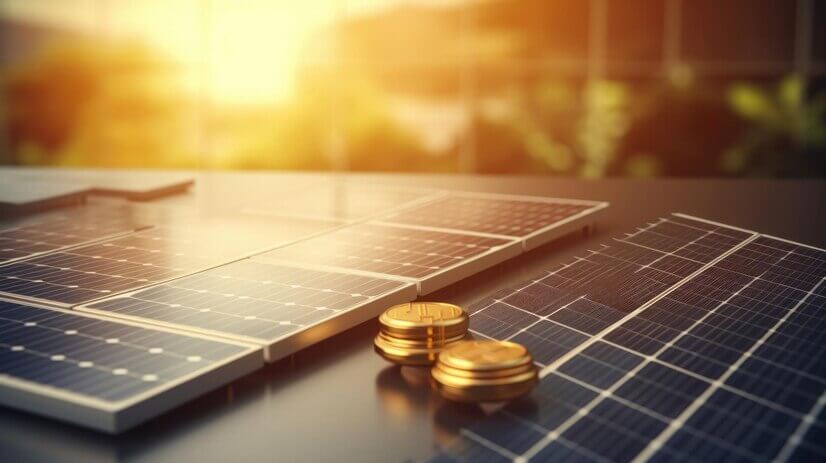
Installing solar panels doesn’t just reduce energy costs—it can also increase the value of your property. Studies have shown that properties with solar energy systems tend to sell for more and are more attractive to potential buyers or tenants.
Today, more people are prioritizing sustainability. Owning a solar-powered building not only showcases a commitment to green energy but also offers significant financial savings by lowering energy bills.
Whether you’re a property owner or a business looking to add long-term value, solar is a smart investment that can lead to increased property values and a higher resale price.
5. Solar Energy Contributes to Job Creation
The global transition to solar energy is creating millions of jobs, and the industrial sector is playing a vital role in driving this change. As the demand for solar systems rises, so does the need for skilled workers who can design, install, and maintain these systems.
By investing in solar energy, companies are not only cutting costs and boosting their sustainability credentials, but also contributing to the creation of green jobs and a stronger economy.
The Indian government has created the PM Surya Ghar Muft Bijli Yojana, an innovative plan aimed at converting 10 million households to solar power. This will create thousands of jobs in the renewable energy sector, further boosting economic prospects in various sectors of India.
In addition to this, the Ministry of New and Renewable Energy (MNRE) also launched the Pradhan Mantri Kisan Urja Suraksha evam Utthaan Mahabhiyan Yojana (PM-KUSUM Scheme) in 2019, empowering farmers with solar-powered irrigation pumps for cultivation. This enables them to generate clean energy and sell solar power to the grid. Farmers will also receive a 60% subsidy to install tube wells and pump sets, along with an additional 30% of the total cost as a loan from the government.
6. Solar Panels Require Minimal Maintenance
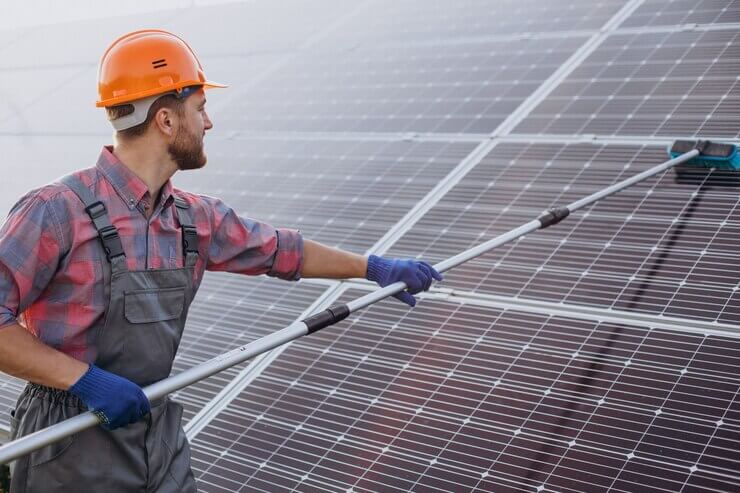
Solar energy systems are incredibly low-maintenance, making them a hassle-free solution for long-term energy needs. Most commercial solar panels, especially grid-tied systems, require very little upkeep.
In fact, solar panels can last 25 to 30 years with minimal intervention, allowing you to enjoy decades of energy savings with little maintenance effort. Routine checks to clear dust or debris from the panels ensure maximum efficiency.
However, if you’re opting for off-grid solar systems with battery storage, you may face higher maintenance costs due to battery replacement needs every 3 to 5 years.
7. Solar Energy Helps Reduce Carbon Footprint
One of the most important facts about solar energy is its contribution to reducing greenhouse gas emissions. By switching to solar power, you can significantly decrease your carbon footprint.
Solar power facts show that each kilowatt of solar panel generated can reduce up to 1 ton of carbon dioxide annually, which is equivalent to planting about 40 trees a year!
8. Solar Power Can Be Stored for Later Use
With the integration of battery storage systems, excess solar energy generated during the day can be stored for use at night or on cloudy days. This is one of the most innovative facts about solar energy that people living in remote areas or facing excessive power cuts can take advantage of.
Energy storage ensures uninterrupted power, making solar power even more reliable and efficient.
9. Solar Panels Have a Long Lifespan
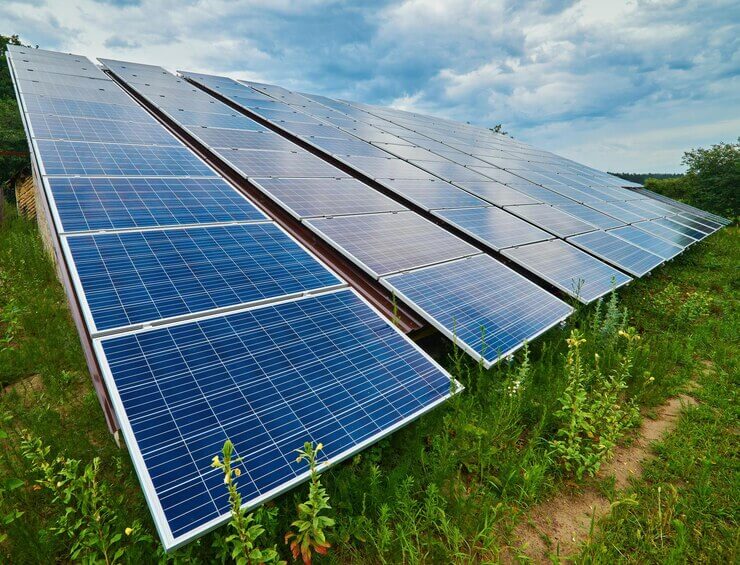
One of the key facts about solar panels is their durability. For example, Solarium offers high-quality solar panels lasting up to 25+ years with proper maintenance and care.
This means you can enjoy decades of clean, renewable energy at a consistent cost. These proven solar facts show that if you invest in solar, you see long-term financial benefits and energy independence.
10. Solar Power is Silent and Pollution-Free
Solar power stands out as a truly clean energy source, generating electricity without the harmful emissions associated with traditional power sources like coal or natural gas.
Unlike fossil fuels, which release pollutants into the air and contribute to global warming, solar energy produces zero emissions during its operation. Additionally, solar power doesn’t produce any harmful byproducts or pollutants, making it a sustainable energy solution for the future.
Also, unlike conventional power plants that generate noise from turbines or generators, solar panels work quietly to convert sunlight into electricity. This lack of noise pollution makes solar power an excellent option even for companies located in residential or urban areas, where noise concerns are more prevalent.
11. Solar Energy is Versatile
Solar energy offers a wide range of applications, from rooftop solar panels generating electricity to solar water heaters that reduce reliance on conventional energy sources.
It can also power solar streetlights, providing sustainable lighting without using grid electricity, making it ideal for both residential and commercial use. This versatility makes it a suitable solution for both residential and commercial applications.
Whether powering homes, heating water for businesses, or lighting public spaces, solar technology adapts to different applications, helping organizations and homeowners reduce energy costs and promote sustainability.
Solar Panels: Lifespan, Impact, and Storage Innovations
Durability and lifespan
When it comes to solar energy facts, one of the most impressive features of solar panels is their incredible lifespan. On average, solar panels last between 25 and 30 years, slowly generating less power as time goes on.
The lifespan of solar panels depends largely on the type and quality of materials used, but don’t worry – with the right care and maintenance, your panels can continue to work well beyond their expected lifespan. Some high-quality panels have been known to power homes for 40+ years!
Environmental Impact

Another great fact about solar panels is their minimal environmental footprint. Unlike traditional energy sources, solar panels produce no harmful emissions while converting solar energy into electricity.
Additionally, solar panel production is far less wasteful compared to other manufacturing processes, contributing little pollution in the process. Of course, the environment where your solar panels are installed can impact their performance.
Extreme weather or temperature fluctuations can wear them down, but even with those challenges, solar power facts reveal that the overall environmental impact of solar technology remains far more sustainable than conventional energy sources.
Energy Storage
The above facts about solar energy clearly show that as we all start to utilize the power of the sun more and more, solar storage is advancing at lightning speed.
With growing awareness of sustainable living, battery innovations are evolving quickly, too. Cutting-edge technologies like solid-state battery packs, lithium-ion batteries, and lithium-sulfur batteries are revolutionizing the energy storage industry.
Energy storage systems are becoming more efficient, with greater energy density and faster charging capabilities. The result? We’re getting closer to the day when we can store solar energy for longer periods, making solar power more reliable and accessible than ever before.
Conclusion: Facts about Solar Energy
Solar power is a game-changer, providing both environmental and financial rewards. From reducing energy bills to boosting property value, solar is a smart investment for homeowners, businesses, and communities alike.
By understanding solar power facts, you can take part in the solar revolution, making a positive impact on the planet while saving money. By knowing and accepting the facts about solar energy and its advancement, we can make the path to a better, greener future.
Ready to make the transition?
Whether you want to lower your carbon footprint or enjoy long-term savings, solar energy is the solution. Solar energy professionals at Solarium can guide you through the process, helping you explore the latest solar innovations and installation options.
Don’t wait—take the first step toward a cleaner, more sustainable future today with Solarium Green Energy.
